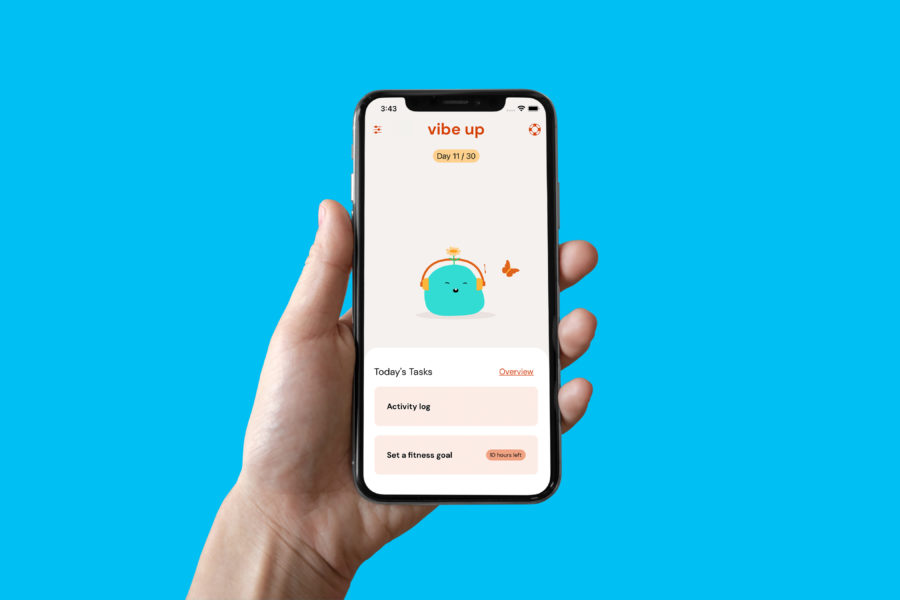A study between Deakin and the Black Dog Institute is investigating how a novel AI-based trial method can deliver effective digital treatment to support student wellbeing.
Many university students experience stress and anxiety during the initial transition into university.
As well as this, more than 1 in 4 students experience high-stress levels that negatively impact their studies, relationships, and daily lives.
This type of psychological distress is not only linked to the development of more serious mental health disorders, but may also impair academic performance, and trigger substance abuse and suicidal tendencies.
Given the severe impact of the COVID-19 pandemic on life routines, plans and social interactions, students’ abilities to seek face-to-face and peer support for mental wellbeing has been greatly reduced over the past two years.
In response, Deakin University’s Applied Artificial Intelligence Institute (A2I2), in collaboration with the Black Dog Institute (NSW), has developed Vibe Up, a world-first study aiming to change this at scale.
A growing number
A recent Australian study highlighted how psychological distress is prevalent amongst young people, with the percentage increasing from 18.7% in 2012 to 24.2% in 2018.
This is linked to poor academic outcomes, including discontinuation of study, impaired academic performance, and a higher risk of suicide attempt, as well as placing strain on relationships with friends, family and university staff.
There is strong evidence that psychological distress can be reduced through digital interventions such as smartphone apps, including those targeting mindfulness, exercise and sleep.
However, a major problem that currently exists in managing psychological distress is the selection of effective interventions.
Randomised Control Trials (RCT) are the established gold standard to test out interventions. However, they take significant time and resources to conduct. Often, RCTs don’t tell us which treatment will work best for whom, given their demographics, symptoms, or severity.
Recent technology advancements enable trials to be conducted more efficiently, allowing researchers to learn how treatments affect different people. This way, the most appropriate treatment can be selected for an individual, in real time.
Vibe Up: a novel approach to large scale trials
Vibe Up expands beyond traditional trial method paradigms.
The research team is experimenting with a novel ‘adaptive trial design’ and will recruit over 1000 participants, each with a unique experience of university life.
The study is delivered to participants via an Android or iOS phone app, offering participants remote access to psychoeducational interventions. Recently, the app was made available to participants, all currently enrolled in tertiary courses.
Throughout the study, there will be a series of Artificial Intelligence (AI)-based ‘mini-trials’ running for up to one month at a time, which aim to discover the most effective interventions. These will be analysed and predicted using algorithms, in response to survey data from participants.
“New developments in AI offer a unique and scalable way to address the problems associated with RCTs,” Dr Leonard Hoon said, Senior Technical Product Manager at A2I2, and Vibe Up project lead.
“This is a novel approach that has only recently been introduced to limited health settings, in skin cancer and improving physical activity. It has yet to be trialled within the mental health realm.”
The bigger picture
Speaking further with Dr Hoon, he highlighted how the technology and techniques incorporated within the Vibe Up study have great potential to expand from their current application.
“Our approach is expandable into any domain that involves delivering effective, tailored support to people. For example, these methods can be remapped for the education sector, to help find the most effective way to engage with a student.
“The accompanying app aims to anonymously and safely understand a person’s general wellbeing and life data. This results in informed decision-making around what interventions are recommended to an individual.”
Head of Clinical Research at the Black Dog Institute, and Vibe Up Study Lead, Associate Professor Jill Newby commented on the study’s core aim.
“Accessing effective healthcare is a basic necessity. The COVID-19 pandemic has stressed the importance of supporting our mental wellbeing via remote means.
“Through Vibe Up, we aim to provide a richer and more streamlined healthcare experience, to help people get the most effective treatment as fast as possible.”
The Vibe up study is made possible by the MRFF grant and recently went live with the first mini trial. For more information on the project, head over to the Black Dog Institute website.




